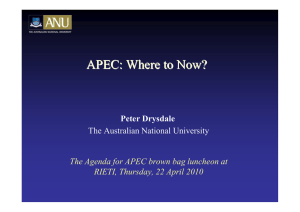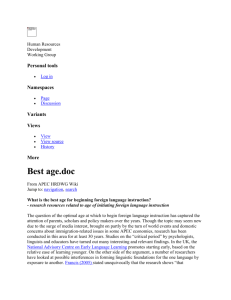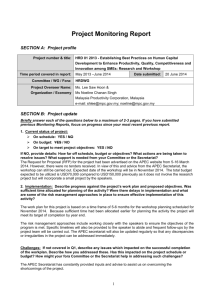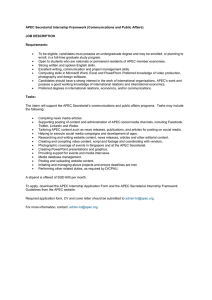Dr. Lee H. Endress - UHERO
advertisement
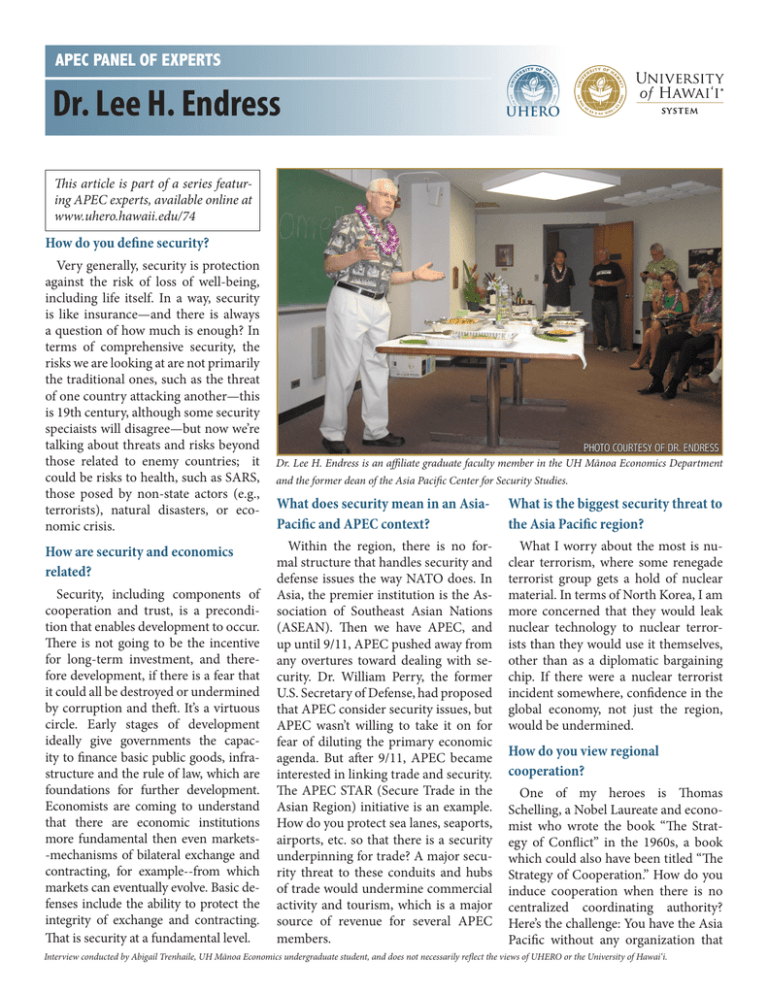
APEC PANEL OF EXPERTS Dr. Lee H. Endress UHERO This article is part of a series featuring APEC experts, available online at www.uhero.hawaii.edu/74 How do you define security? Very generally, security is protection against the risk of loss of well-being, including life itself. In a way, security is like insurance—and there is always a question of how much is enough? In terms of comprehensive security, the risks we are looking at are not primarily the traditional ones, such as the threat of one country attacking another—this is 19th century, although some security speciaists will disagree—but now we’re talking about threats and risks beyond those related to enemy countries; it could be risks to health, such as SARS, those posed by non-state actors (e.g., terrorists), natural disasters, or economic crisis. How are security and economics related? Security, including components of cooperation and trust, is a precondition that enables development to occur. There is not going to be the incentive for long-term investment, and therefore development, if there is a fear that it could all be destroyed or undermined by corruption and theft. It’s a virtuous circle. Early stages of development ideally give governments the capacity to finance basic public goods, infrastructure and the rule of law, which are foundations for further development. Economists are coming to understand that there are economic institutions more fundamental then even markets-mechanisms of bilateral exchange and contracting, for example--from which markets can eventually evolve. Basic defenses include the ability to protect the integrity of exchange and contracting. That is security at a fundamental level. PHOTO COURTESY OF DR. ENDRESS Dr. Lee H. Endress is an affiliate graduate faculty member in the UH Mānoa Economics Department and the former dean of the Asia Pacific Center for Security Studies. What does security mean in an AsiaPacific and APEC context? What is the biggest security threat to the Asia Pacific region? Within the region, there is no formal structure that handles security and defense issues the way NATO does. In Asia, the premier institution is the Association of Southeast Asian Nations (ASEAN). Then we have APEC, and up until 9/11, APEC pushed away from any overtures toward dealing with security. Dr. William Perry, the former U.S. Secretary of Defense, had proposed that APEC consider security issues, but APEC wasn’t willing to take it on for fear of diluting the primary economic agenda. But after 9/11, APEC became interested in linking trade and security. The APEC STAR (Secure Trade in the Asian Region) initiative is an example. How do you protect sea lanes, seaports, airports, etc. so that there is a security underpinning for trade? A major security threat to these conduits and hubs of trade would undermine commercial activity and tourism, which is a major source of revenue for several APEC members. What I worry about the most is nuclear terrorism, where some renegade terrorist group gets a hold of nuclear material. In terms of North Korea, I am more concerned that they would leak nuclear technology to nuclear terrorists than they would use it themselves, other than as a diplomatic bargaining chip. If there were a nuclear terrorist incident somewhere, confidence in the global economy, not just the region, would be undermined. How do you view regional cooperation? One of my heroes is Thomas Schelling, a Nobel Laureate and economist who wrote the book “The Strategy of Conflict” in the 1960s, a book which could also have been titled “The Strategy of Cooperation.” How do you induce cooperation when there is no centralized coordinating authority? Here’s the challenge: You have the Asia Pacific without any organization that Interview conducted by Abigail Trenhaile, UH Mānoa Economics undergraduate student, and does not necessarily reflect the views of UHERO or the University of Hawai‘i. looks like the North Atlantic Treaty Organization (NATO). You have ASEAN, but the association doesn’t operate with any binding constraints or mechanism for enforcement. So what we need to study and pursue is how cooperation can emerge and be sustained from the bottom up, rather than from the top down (what some have called “coercive cooperation”), with emphasis on comprehensive security threats that challenge the region as a whole. This is an ongoing project of expanding the infrastructure of trust and confidence among security professionals. Do you think a regional trade agreement, like the Trans Pacific Partnership is feasible? What do you see as America’s role within APEC? Why is APEC 2011 important to Hawaii? One theory is that, given the diverse histories and cultures of countries in the region, along with legacies of mistrust, to some degree, the U.S. is an honest broker. Countries will say this privately to U.S. officials and analysts, but not publicly, because they don’t want to be seen as catering to U.S. interests. At the same time, being an honest broker, and having some military presence in the region, the U.S. Seventh Fleet for example, is generally considered to be a good thing. So, while having a U.S. presence is good, the U.S. is also encouraging other countries to take a leadership role in managing regional crises. The other obvious thing is that, given our growing national debt and commitment to two wars in the Middle East, we can’t afford to always be the lead emergency responder. The U.S. has to be very careful in how it shows up in the region, so that it is viewed as a constructive partner, not domineering player. There is always going to be some degree of resentment, but other countries want the U.S. around. So, security presence will continue to evolve. As to America’s role in APEC, we should continue to be an active participant and member at all levels, leaders, senior officials and working groups. This serves both national and regional interests in advancing economic and security cooperation. One of the reasons APEC is important is because we can showcase Hawaii as a serious place. People have tried to portray Hawaii as Geneva of the Pacific, but we’re not there yet. APEC 2011 is the one time we are going to get a shot at this, so it’s important we do it right in terms of logistics, administration, atmospherics, and how we portray Hawaii. Here is one of the biggest challenges. That is, there seems to be some reluctance in featuring tourism in that it is perceived to undermine Hawaii’s image as a serious place. The reality is that tourism is our comparative advantage and our major export industry. We bring the customers here. People typically think that tourism is just going to the beach, but I think there is a major opportunity and potential in thinking of all the spinoffs of Hawaiian tourism, given our natural endowments. We can have health tourism, eco-tourism, sports tourism, spiritual tourism, adult-learning tourism. And this is fitting, since Hawaii probably has more diversity than any other place in the U.S. You have all these spinoffs, where you get top line people in their fields— medicine, health, sports, education— so we’re talking about more than lower paying jobs, like cleaning hotel rooms. Tourism has the potential to be so much more. Here’s the other thing: Isn’t it interesting that in Honolulu, the U.S. is going As for prospects, yes, but look at the World Trade Organization and the Doha round. It’s no longer just the simpler border issues, like tariffs; we are getting into agriculture, intellectual property, industrial organization, environmental issues, labor, and human rights—all of these are complex and there are no easy answers. I think the passage of an agreement is going to be difficult, but not impossible. to host APEC, which is for international exchange and trade liberalization, while at the same the State of Hawaii is desperately seeking energy and food independence, downplaying tourism? Not only is total independence infeasible, it’s undesirable. We need to look toward expanding our comparative advantage rather than isolating ourselves at tremendous cost to Hawaii’s economic well-being and opportunity. Education is a premier thing we ought to promote here big time. The University of Hawaii and other educational institutions, individually and collectively, can be world class centers for life-long, shared learning. And this serves as a foundation for regional cooperation, which is what APEC is all about. For this rare, one time opportunity that APEC 2011 represents, we should showcase Hawaii in a positive way without hiding what we have to offer. ABOUT DR. ENDRESS As the former academic dean of the Asia Pacific Center for Security Studies (APCSS), Dr. Endress is intimately familiar with the political, economic, security and trade issues of the Asia Pacific region. Holding degrees in both mathematics (MA) and chemistry (BSc), Dr. Endress worked for the Submarine Force, Pacific Fleet, before getting his Ph.D. in economics from the University of Hawai‘i and becoming the Chief Economic Advisor at the United States Pacific Command. During his tenure at Pacific Command, he was heavily involved in issues surrounding the 1990’s Asian financial crisis and foreign policy. In 2004, Dr. Endress became academic dean of APCSS, an executive educational institution, founded by the U.S. Department of Defense in 1995. Its non war-fighting mission is to foster leader development and security cooperation in the Asia-Pacific region. Since retiring in 2009, Dr. Endress has continued to teach and advise students in the University of Hawaii’s Economics Department. Interview conducted by Abigail Trenhaile, UH Mānoa Economics undergraduate student, and does not necessarily reflect the views of UHERO or the University of Hawai‘i.
